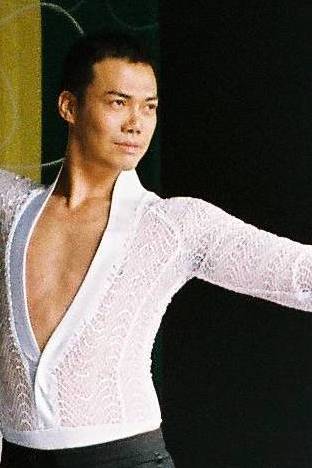Cantopop is a genre of pop music written in standard Chinese and sung in Cantonese. Cantopop is also used to refer to the cultural context of its production and consumption. The genre began in the 1970s and became associated with Hong Kong popular music from the middle of the decade. Cantopop then reached its height of popularity in the 1980s and 1990s before slowly declining in the 2000s and shrinking in the 2010s. The term "Cantopop" itself was coined in 1978 after "Cantorock", a term first used in 1974. In the 1980s, Cantopop reached its highest glory with fanbase and concerts all over the world, especially in Macau, Mainland China, Taiwan, Singapore, Malaysia, South Korea, and Japan. This was even more obvious with the influx of songs from Hong Kong movies during the time.

Fruit Chan Gor is a Hong Kong filmmaker who is best known for his style of film reflecting the everyday life of Hong Kong people. He is well known for using amateur actors in his films. He became a household name after the success of the 1997 film Made in Hong Kong, which earned many local and international awards.

Commercial Radio Hong Kong, or Hong Kong Commercial Broadcasting Company Limited is one of the two commercial radio broadcasting companies in Hong Kong alongside Metro Radio Hong Kong. CRHK provides radio programmes including news and weather reports, music, and cultural arts.

Ekin Cheng Yee Kin is a Hong Kong actor and singer. Early in his career, he used the name Dior as a first name. He has also been referred to his stage name Noodle (伊麵), after a popular noodle dish with a similar name and his wavy long hair. Currently Ekin is the name used.

Lee Moon-shuen known professionally as Lee Hoi-chuen, was a Chinese opera singer and film actor in Hong Kong. He was the father of Bruce Lee, the father-in-law of Linda Lee Cadwell, and the paternal grandfather of Brandon Lee and Shannon Lee.
Like their American counterparts, a significant number of Canadians live and work in Hong Kong. In February 2011 research from the Asia Pacific Foundation, conducted with Hong Kong Baptist University, suggests there are at least 295,000 Canadians in Hong Kong, which is more than the population of places like Regina or Saskatoon. Nearly 85% of Canadians in Hong Kong were born in Canada, a figure higher than in Canada itself (80.2%). This represents the third largest community of Canadians, after Canada itself and the United States. The overwhelming majority of these are ethnic Chinese.

Kwan Wai Pang, known professionally as Teddy Robin, is a Hong Kong English pop singer-songwriter, actor, and director and producer. He began his music career in mid 1960s when Hong Kong English pop was at its peak. He formed a rock and roll band with his friends called Teddy Robin and the Playboys while Teddy was the vocal and guitarist. The band was the first Chinese-led rock band in Hong Kong. The band became a massive hit in Hong Kong.

The Civil Human Rights Front (CHRF) was an organisation that focused on the issues of Hong Kong politics and livelihood, affiliated with almost all pan-democratic camps in Hong Kong. It was founded on 13 September 2002 and disbanded on 15 August 2021.
Hong Kong English pop or Rock is a genre of music consisting of English-language songs that are made, performed and popularised in Hong Kong. It is known as simply English pop by Hong Kongers. The height of the English pop era in Hong Kong was from the 1950s to mid-1970s.

Michael Tse Tin-wah is a Hong Kong actor and singer.
The four big families of Hong Kong is a term used to describe the four business families who historically rose to prominence and became influential in Hong Kong. In order of influence, they are Li, Ho, Lo and Hui family.
Romeo Diaz, known initially as Lo-dik and later as Tai Lok-man, is a Filipino music composer, record producer and music director. He was one of the members of the popular band Danny Diaz & The Checkmates in Hong Kong in the 1960s along with his two brothers, Danny Diaz and Rudy Diaz.

Gallants is a 2010 Hong Kong action comedy film directed by Derek Kwok and Clement Cheng, starring Leung Siu-lung, Chen Kuan-tai and Teddy Robin. The film is set in modern times, but is in the style of Hong Kong action comedy films from the 1960s and 1970s. The film premiered at the Hong Kong Film Festival on 26 March 2010. The film has received favourable reviews on its festival shows in North America.
Hong Kong Americans, include Americans who are also Hong Kong residents who identify themselves as Hong Kongers, Americans of Hong Kong ancestry, and also Americans who have Hong Kong parents.

Salesian English School (Secondary Section), is a secondary boys school in Hong Kong. Founded by the Roman Catholic religious institute the Salesians of Don Bosco, it is located at Chai Wan Road, Shau Kei Wan, Hong Kong Island. The school's patron saint is Blessed Filippo Rinaldi and the motto is "Alere Flammam".
Diamond Records was a record label for Hong Kong and the far East. It featured a good amount of Hong Kong's most popular recording acts and attractions in its catalogue.

FHProductionHK is a Hong Kong YouTube channel. Started in 2012, the channel produces comedic videos that focus on social issues in Hong Kong.

Hong Kong Chinese Christian Churches Union Pok Fu Lam Road Cemetery or Hong Kong Chinese Christian Churches Union Pokfulam Road Cemetery is a cemetery in Pok Fu Lam, Hong Kong. It is managed by The Hong Kong Chinese Christian Churches Union (香港華人基督教聯會). It lies on the slopes east of Victoria Road between Tung Wah Coffin Home and Pok Fu Lam Road, facing Sandy Bay.

"Don't Make My Baby Blue" is a song by Frankie Laine, released as a single in March 1963. It peaked at number 51 on Billboard Hot 100. It was later covered by the Shadows, who had a hit with it in the UK.











